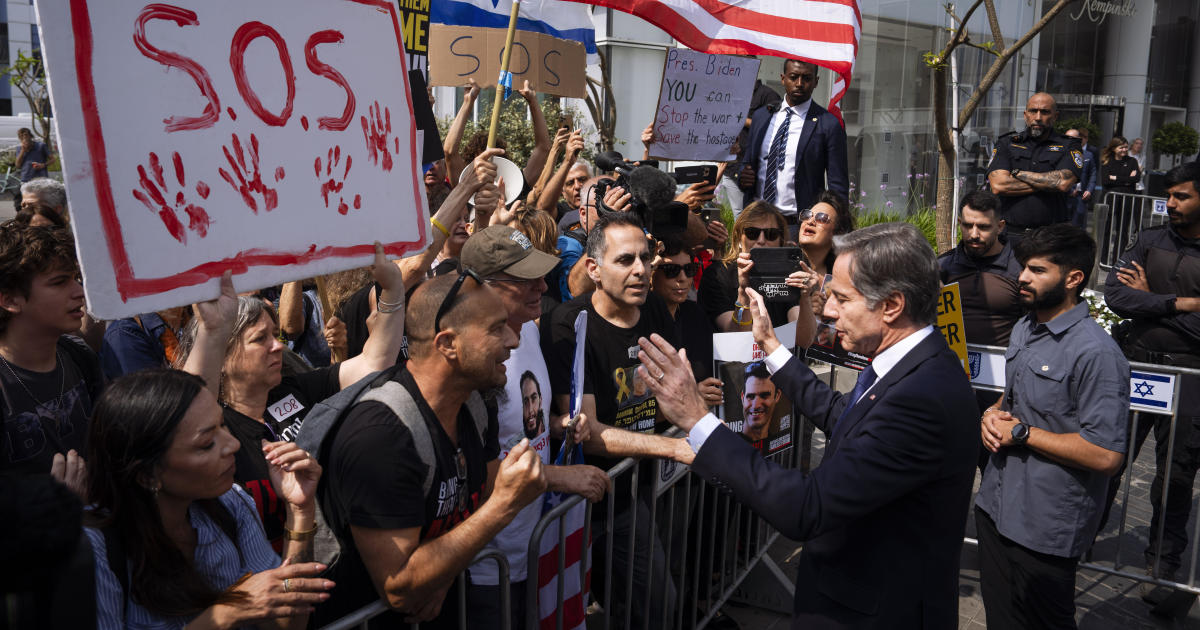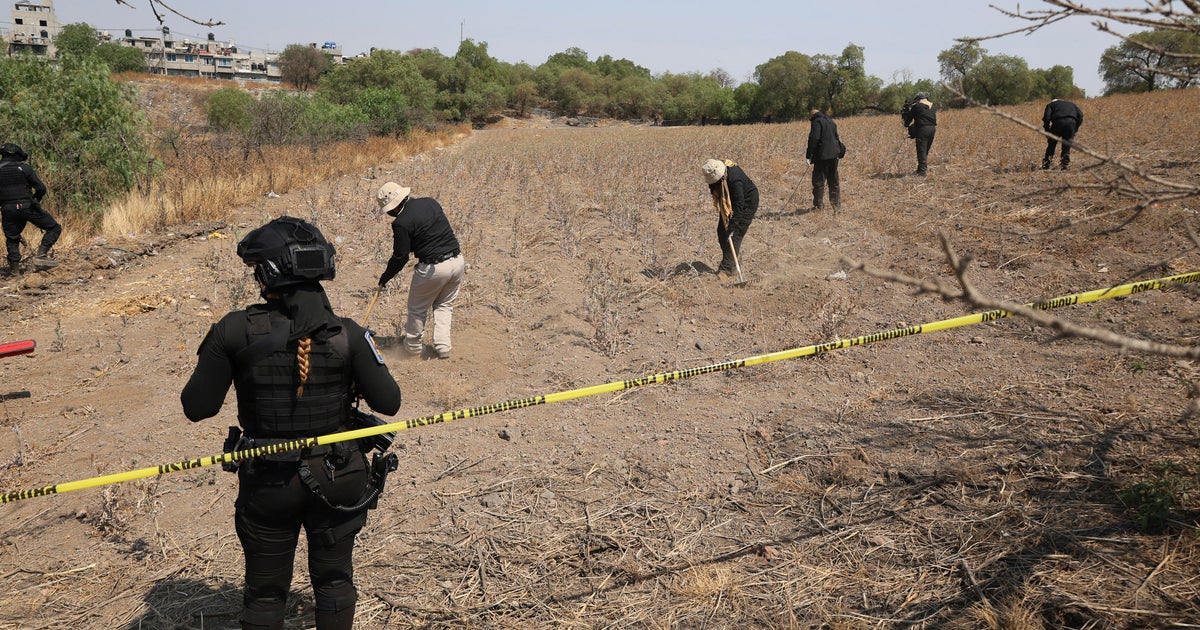Transcript: Commerce Secretary Gina Raimondo on "Face the Nation," September 3, 2023
The following is a transcript of an interview with Secretary of Commerce Gina Raimondo that aired on "Face the Nation" on September 3, 2023.
ROBERT COSTA: We now go to the Secretary of Commerce Gina Raimondo. Good morning, Secretary. Thanks for being here. Let's begin with the economy. On Friday, the Bureau of Labor Statistics released the jobs report for August, and people around their tables this weekend are looking at it. It shows 187,000 jobs were added last month, exceeding expectations. But more people are working more than one job. How worried are you about this?
SECRETARY GINA RAIMONDO: Good morning, thanks for having me. This jobs report is exactly what we want to see at this point in the recovery. As you just said, you know, creating more jobs, really exciting is that people are getting off of the sidelines. You know, we're seeing more people come into the labor force and there are jobs for them. As you say, people are working, you know, more than one job and wages are up, it should be said, but this is exactly why President Biden is so focused on creating manufacturing jobs, which are higher paid, getting folks the skills they need to get a higher paying job. There's still a lot of work to do to make sure that every American has the skills they need to get a job, which is family support and sustaining. But- and we're doing that work. But overall, there's a lot to like in this jobs report. And it's exactly- it exceeded our expectations.
ROBERT COSTA: In terms of that work that's still to be done, the administration is touting its efforts. It's confident in the economy. But our CBS News polling, Secretary, shows 65% of Americans still view the economy as being in a bad place. Why do you believe your administration, along with President Biden, has struggled to reassure those Americans about these policies and about the economy?
SEC. RAIMONDO: So it's- it's an interesting, you know, dichotomy between the- the numbers, and as you say the polling numbers or the- the perception numbers, I think the reality is that inflation still exists. And it is, you know, something that people see on a daily basis when they go to the grocery store, or pay their rent, or pay their mortgage. And we have to know that, you know, that's still a challenge for folks. That being said, if you look at where we are today, compared to when the President took office, it's an unbelievable story of progress. And I will tell you, even I, you know, his- the President's Commerce Secretary, if you had told me when we started based on where the economy was, how high the unemployment rate was, how, you know, disrupted supply chains were, that we'd be sitting here now with this jobs picture, I might not have believed it. I mean, it's just a stunning amount of progress. The economy- we're among the strongest economies in the world. We all went through COVID, right, Europe did, China did, Asia did yet we have emerged, the fastest and the strongest. So I don't want to minimize what Americans are feeling, and that's why we get up and go to work every day. But this economy by any measure is doing incredibly well and much better than anyone could have predicted I think three years ago when we started.
ROBERT COSTA: After looking back, let's also look ahead, the White House is working with Congress to hammer out an agreement on a short term funding measure to avoid an October 1 partial federal government shutdown. When you talk to business leaders right now, are they worried about this deadline and what a shutdown could mean for the US economy?
SEC. RAIMONDO: Yes, they are worried- they're very worried. They are, I think, in some cases, frustrated that this is how government operates. You know, what businesses need to be successful is- is predictability, you know, predictability, some semblance of, you know, regular order. And so these sorts of disruptions that are mainly driven by politics. So it's a challenge for the economy and have the potential to set us back. So I do hope that there will be a speedy resolution.
ROBERT COSTA: Secretary, you are the first commerce secretary in five years to be on the ground in China in recent days. What progress, if any, do you think you made on the ground there?
SEC. RAIMONDO: I think we made a great deal of progress. In terms of concrete deliverables, I was able to open three specific lines of communication with the Chinese, which is a huge step forward. We haven't really had any contact in more than five years. So we agreed to share information about export controls, we agreed to open a dialogue on commercial issues, which is so important, because China has not treated US business fairly. And so it's- we got to put those issues on the table. And we agree to have exchange around trade secrets, another area where businesses need to- deserve to know that their trade secrets will be protected in China. But I think more than any of that we just are starting to resume a direct line of contact and communication, which we need to do if we're going to manage what is a very complex and potentially volatile relationship with China.
ROBERT COSTA: So people may be heartened to hear at least some that the US and the Chinese, they're talking, there's open lines of communication right now. But what's next, beyond having this dialogue? What specifically can you say is going to happen next?
SEC. RAIMONDO: So my message to the Chinese officials with whom I met is that action speaks louder than words. So they gave verbal assurances that they will treat US businesses fairly, that they will not engage in non-market practices which hurt American workers. And my message was, well, let's see it. You know, actions speak louder than words. So time will tell whether they are going to really be as they say they want to be, you know, more market oriented and open and reform minded when it comes to their economy, their regulatory regime. They need to be less arbitrary in the way they administer regulations to actually give American businesses a fair shot to compete.
ROBERT COSTA: You said on the trip that quote, increasingly, I hear from American business that China is uninvestable, because it becomes too risky. So what exactly did you get in terms of those assurances from the Chinese, that would really give confidence to American business leaders?
SEC. RAIMONDO: They said that they would talk to American businesses and begin to address these issues. Like, for example, one of the complaints I hear frequently from US business, by the way, business who are used to doing business in- in difficult parts of the world. They say that, you know, China's regulations are not at all transparent. You know, they'll raid a business in March and not explain what went on for many months. They will arrest folks but not provide due process or tell you what happened. And so when I expressed these concerns, I was heard, I wasn't given any promises. But one thing that I think we can take a bit of heart in is it's in China's interest. It's in their economic interest to have foreign direct investment and to make sure, you know, they had a very good economy when they were market oriented and reform minded. And so we have to hope that self interest will affect their future decisions.
ROBERT COSTA: So they might have that motivation, but you saw them face to face, you had meetings with them. That's the value of having these sorts of trips. Do you trust the Chinese at this point after all of your conversations, after digesting what happened on your trip, do you trust them?
SEC. RAIMONDO: Trust is probably not the word I would use. We need to see action. And until we see action, there can be no trust.
ROBERT COSTA: And they hacked into your own email account so that might have hurt the ability to have a trustworthy relationship.
SEC. RAIMONDO: Exactly. And I said that, you know, hacking my account erodes trust, undermining American workers, by over subsidizing certain industries erodes trust, treating American businesses unfairly on the ground erodes trust. So but, you know, look, I- we can't be naive and oversimplify this relationship, this very challenging relationship. But we have to be practical, right? We have to protect ourselves first and foremost, national security, the United States. Beyond that we have to be practical and look for places where we can have a strong commercial relationship because we need stability in this relationship. That's good for America. And- and I think it's what the world is expecting of us and of China.
ROBERT COSTA: You're looking for stability, Secretary. But the big question is, is China's economy stable? There have been indicators over the last several months that showed China's economy's in a slowdown. When you were over there, did you get insights, if any, about whether the Chinese economy is slowing down? And how concerning would that be for the United States?
SEC. RAIMONDO: I think there's no question that it is slowing down. And certainly they're having real, real significant challenges in the real estate sector, which they readily acknowledged when I was there. But again, to my mind, the facts are quite clear in this regard. When China was more market oriented, open, you know, a little bit more transparent, their economy did very well. And more recently, as they have closed down and become more arbitrary in the way they administer regulations, the economy is quite challenged. So time will tell. The decision- the ball's in their court- the decisions are theirs. We want a large and stable economic relationship with them, but they have to play by the rules. And we are always going to act in our own American self-interest.
ROBERT COSTA: Speaking of playing by the rules, there's such a standoff right now between the Chinese and tech companies. Semiconductors are crucial for our economy, yet China's threatening to curb the mineral supply to the US and the West. And many US businesses tell CBS they're operating in China, but seeing this hostile environment with raids, and fines. So how is your administration going to solve this back and forth between the Chinese and the tech industry?
SEC. RAIMONDO: This is exactly why I went to China. It's exactly why I went, showed up, had meetings. I met with my counterpart for more than four hours. I met with the premier for more than one hour. They were open, candid, honest discussions. How are we going to resolve these issues? Because I'll tell you, prior to going to China, I personally spoke with more than 100 US business leaders and labor leaders. And what they tell me is that even the ones that have been doing business in China for decades, you know, these are sophisticated people used to dealing with the traditional concerns of, you know, IP- IP theft or non-market practices. They say, it's much harder now. Right? Like China is making it more difficult because of the reasons you say the raids, the counter espionage law. They are going to make a business decision to do business in other countries unless that improves. And so I was very clear with China that we need to- patience is wearing thin among American business. They need and deserve a predictable environment and a level playing field. And hopefully China will heed that message so we can have a stable growing commercial relationship.
ROBERT COSTA: And there are many voices as you know in the ears of American business leaders. A Wall Street Journal report, earlier this year, for example, said that the FBI director, Christopher Wray, wants businesses to help fight China and cyber threats. He reportedly said that only through cooperation with the FBI can that agency marshal an effective response. Do you agree with Director Wray?
SEC. RAIMONDO: I agree that business has an important role to play partnering with us to ensure America's national security across a range of different areas, including technology. And, you know, that's why we are in such close contact with business, frankly, often the information they have on the ground is some of the best that we can- we can get.
ROBERT COSTA: But is it good for businesses to work with the FBI specifically?
SEC. RAIMONDO: Every business has to make their own decision. But I definitely think there's value- there's mutual value for business, and certainly for the government to have communication and coordination.
ROBERT COSTA: And I'm often out on the campaign trail, Secretary. And I know you stay out of politics. But one thing I'm hearing from so many Republicans across the country, especially governors, they want to block Chinese companies from making investments and buying farmland in the United States. Does the Biden administration and do you support Chinese companies making investments and buying farmland in the United States?
SEC. RAIMONDO: We have to be very, very careful, we have to screen every investment and make a decision as to whether it hurts our national security or not. Not every investment from China into America is- harms our national security, but many do. And so it's a case by case basis, looking into the facts and being as tough as we need to be, but also being, you know, realistic and not hyperbolic. Just being, like I say, practical. It's time to be practical, pragmatic and serious about managing every aspect of this relationship.
ROBERT COSTA: Secretary Raimondo, we appreciate you taking the time on a Sunday. Thank you.
SEC. RAIMONDO: Thank you. Have a great Labor Day weekend.



